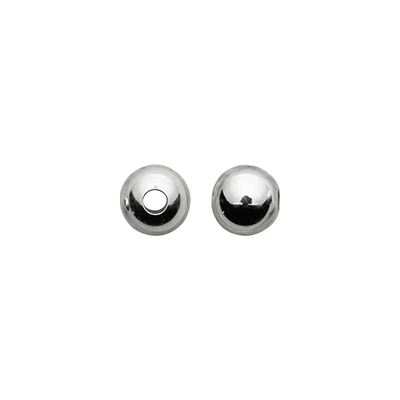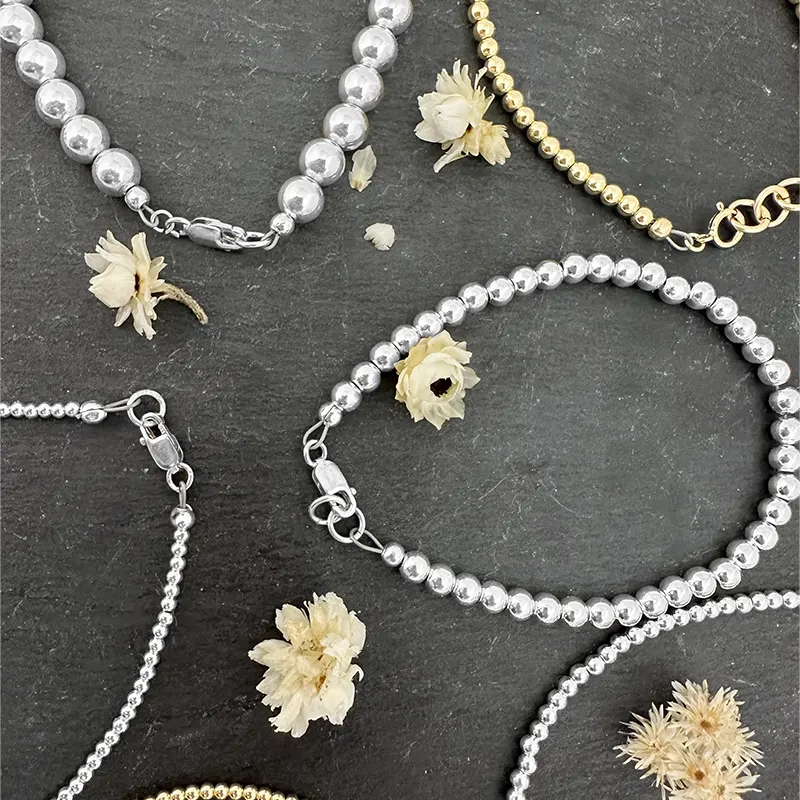Sterling Silver 3mm Beads
S1030M
Sterling Silver 3mm Plain Round Seamless Beads, 1.0mm Hole



Sterling Silver 3mm Beads
S1030M
Sterling Silver 3mm Plain Round Seamless Beads, 1.0mm Hole
Total:

Loading Pricing...
Specs
| Material | Sterling Silver |
| Recycled Detail | 75% Pre-Consumer Recyled Silver |
| Nation of Origin | Italy |
| Finish | Bright |
| Manufacturing Method | Machine Made |
| Anti Tarnish | No |
| Tariff | 7113.11.2000 |
| Gram Weight | 0.04 |
Description
A classic! Sterling silver beads are design building blocks for beading artists and an essential part of your beading supplies collection
What are Seamless Sterling Silver Beads?
Round metal beads are manufactured in two different ways. First, seamless beads are made from tubing that is formed at the mill with continuous casting. This process forms molten silver to shape by making tubes of silver metal. These larger tubes are then drawn down to the desired diameter. The tubing is never soldered since it is formed to shape from the beginning. Once the tube is the desired width, it is shaped and cut into silver beads. Finishing completes the process.
Seamed beads, by contrast, are made from flat sheet metal. The sheet is rolled into a tube shape, soldered closed, formed into rounds along the tube, and then cut apart. Finishing gives the beads their perfectly round shape. These silver beads have a faint visible line at the solder joint that runs from hole to hole.
Seamless silver beads have a couple of advantages that can be important. First, the smaller beads can be crushed and used as crimps. They will not split along the axis. Second, they are less likely to tarnish along the solder seam over time. Tarnish can be easily cleaned, but it is a maintenance issue for beadwork.
Shop matching gold-filled beads here.
How to Clean Sterling Silver Beads
This series of beads is treated with an anti-tarnish coating to delay discoloration. However, tarnish is a natural reaction with sterling silver beadwork. All jewelry made from this material will eventually tarnish and require cleaning. It is best to use a treated silver cleaning cloth to polish tarnished beads on the surface. Do not submerge beadwork in liquid cleaners or you could weaken the stringing cord or wire. Also take care to avoid stones or pearls that can be damaged by cleaning chemicals. Some beadwork may need to be disassembled and cleaned more thoroughly by a jewelry professional.
How to Use Sterling Silver Beads in Your Designs
Small silver beads make great spacers to create a visual separation between your more ornate beads in alternating designs. Use the smaller beads as seed beads in your beadwork. They're perfect for straight stringing because of their small hole.
Larger silver beads in this series have larger holes, allowing you to use more decorative cord to string them on. The large beads add impact and statement to any of your beaded pieces. Watch the video below to find out other great ways to use beads from this series. Check out the blog post below to learn the perfect way to finish off your beaded designs!
What are Seamless Sterling Silver Beads?
Round metal beads are manufactured in two different ways. First, seamless beads are made from tubing that is formed at the mill with continuous casting. This process forms molten silver to shape by making tubes of silver metal. These larger tubes are then drawn down to the desired diameter. The tubing is never soldered since it is formed to shape from the beginning. Once the tube is the desired width, it is shaped and cut into silver beads. Finishing completes the process.
Seamed beads, by contrast, are made from flat sheet metal. The sheet is rolled into a tube shape, soldered closed, formed into rounds along the tube, and then cut apart. Finishing gives the beads their perfectly round shape. These silver beads have a faint visible line at the solder joint that runs from hole to hole.
Seamless silver beads have a couple of advantages that can be important. First, the smaller beads can be crushed and used as crimps. They will not split along the axis. Second, they are less likely to tarnish along the solder seam over time. Tarnish can be easily cleaned, but it is a maintenance issue for beadwork.
Shop matching gold-filled beads here.
How to Clean Sterling Silver Beads
This series of beads is treated with an anti-tarnish coating to delay discoloration. However, tarnish is a natural reaction with sterling silver beadwork. All jewelry made from this material will eventually tarnish and require cleaning. It is best to use a treated silver cleaning cloth to polish tarnished beads on the surface. Do not submerge beadwork in liquid cleaners or you could weaken the stringing cord or wire. Also take care to avoid stones or pearls that can be damaged by cleaning chemicals. Some beadwork may need to be disassembled and cleaned more thoroughly by a jewelry professional.
How to Use Sterling Silver Beads in Your Designs
Small silver beads make great spacers to create a visual separation between your more ornate beads in alternating designs. Use the smaller beads as seed beads in your beadwork. They're perfect for straight stringing because of their small hole.
Larger silver beads in this series have larger holes, allowing you to use more decorative cord to string them on. The large beads add impact and statement to any of your beaded pieces. Watch the video below to find out other great ways to use beads from this series. Check out the blog post below to learn the perfect way to finish off your beaded designs!
Detailed Specs
| Beads | |
| Bead Shape | Round |
| Hole Size | 1mm or less |
| Size MM | 3mm |
Media
×
![]()





